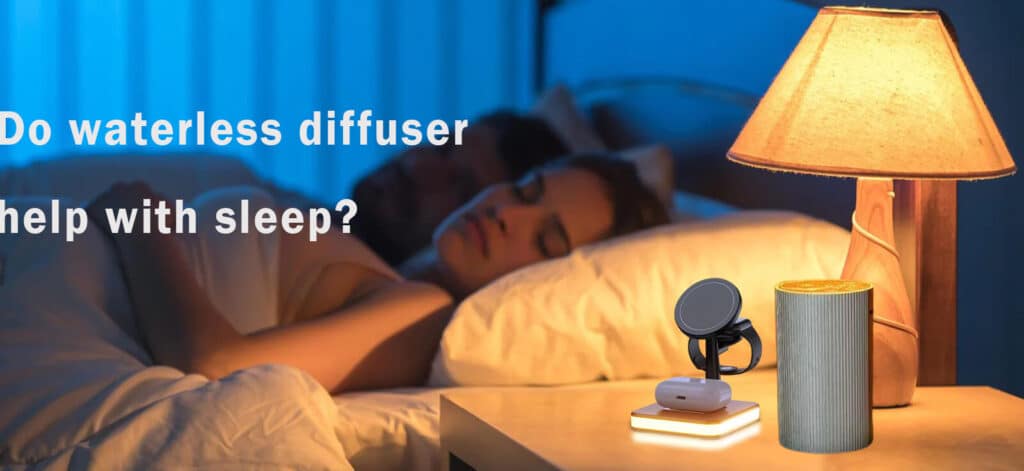The quest for a good night’s sleep has driven many to explore an array of solutions, from age-old remedies to advanced technologies. One such innovation that has captured attention is the waterless diffuser—a device aimed at enhancing sleep quality through the dissemination of essential oils into the air. These sleek and convenient instruments promise not only to simplify the process of aromatherapy but also to deliver potent therapeutic benefits without the need for water. As we delve into the efficacy and mechanics behind these devices, it is crucial to understand whether waterless diffusers genuinely contribute to improved sleep, or if their popularity is merely a whisper in the vast conversation about restful slumber. This article will sift through scientific insights and user experiences to determine the role waterless diffusers play in facilitating the elusive perfect night’s rest.
Do Waterless Diffusers Help with Sleep?
Yes, waterless diffusers can help you sleep better. Traditional diffusers often rely on a mixture of water and essential oils, which then gets dispersed into the air as a fine mist. In contrast, waterless diffusers use nebulizing technology or fan diffusion methods to emit pure oil particles into the air, eliminating any need for dilution.
Since there’s no heat or moisture involved in the operation of waterless diffusers, they may be considered safer to leave running overnight, reducing potential risks such as mold growth from continuous humidity. Plus, their mode of dispersion allows for a more robust concentration of essential oil in the air — impacting sleep through inhalation that triggers responses in our limbic system. This system governs emotions and can also influence the nervous system.
Essential oils have been traditionally used to aid relaxation and improve sleep quality. When we inhale these aromatic molecules, they can have a direct effect on parts of our brain that manage stress and anxiety levels – both common culprits behind sleep disturbances. The efficacy varies by individual experience and specific oil types; however, research suggests that inhalation is indeed an efficient method for receiving the benefits intended for tranquil sleep.
Another key advantage is customization: certain models allow users to control output intensity and duration precisely, providing tailor-made scent environments conducive to personal relaxation preferences throughout the night. Conversely, with traditional diffusers, one may encounter uneven diffusion rates due to evaporation or inconsistencies in mist production when water levels decrease.
It’s worth noting that people respond differently to various scents; therefore, experimentation might be necessary before confirming if a particular aroma effectively aids one’s sleep cycle when using a waterless diffuser. Nonetheless, this type of diffusion offers an innovative way to enhance bedroom environments aiming toward improved quality of rest without some drawbacks associated with their water-based counterparts.
How Waterless Diffusers Can Enhance Sleep
1.How does scent affect sleep
The intersection between scent and sleep has been of interest to researchers and those seeking a restful night alike. Olfactory cues play a fundamental role in how humans relax and transition into sleep. The connection is rooted in the brain’s limbic system, the area responsible for managing emotions and memories, where scent can directly induce a calming effect, paving the way for sleep.
This relationship between fragrance and slumber opens up possibilities for waterless diffusers as effective tools in sleep enhancement. Traditional methods of aromatherapy, while beneficial, often rely on systems using water to disperse essential oils into the air. However, waterless diffusers have certain advantages that might make them more suitable particularly when it comes to influencing sleep patterns.
With waterless technology, these devices emit essential oil molecules without dilution or heat, providing a more concentrated diffusion that can be easily controlled and tailored to individual needs. The absence of water ensures that the dispersion is swift and extensive, reaching across a room evenly which may assist individuals in falling asleep faster since the scent envelops their senses more readily.
Moreover, without the addition of heat or moisture, there may also be less risk for microorganism growth within the device itself—a potential concern with traditional diffusers—making them a hygienic option conducive to promoting cleaner air throughout your sleeping environment. Considering these dynamics in play—the link between scent and restorative slumber along with technological advances—waterless diffusers stand out as potent facilitators capable of cultivating an olfactory setting primed for improved quality of sleep.
2.Specific Essential Oils That Promote Better Sleep
The influence of aromatherapy on sleep cannot be overstated, with certain essential oils taking the forefront in their ability to foster a conducive environment for rest. These oils contain compounds that have a calming effect on the mind and body, thereby easing the transition into sleep. Here is a detailed look at several essential oils renowned for their sleep-promoting properties:
| Essential Oil | Active Compounds | Known Benefits |
|---|---|---|
| Lavender | Linalool, linalyl acetate | Reduces anxiety, induces calmness |
| Chamomile | Bisabolol, chamazulene | Eases nervous system activity |
| Bergamot | Linalyl acetate, limonene | Lowers stress levels, relieves tension |
| Sandalwood | Santalols | Increases deep sleep duration |
| Marjoram | Terpinen-4-ol | Soothes tense muscles, calms the mind |
| Ylang Ylang | Germacrene D, caryophyllene | Lowers heart rate and blood pressure |
| Valerian | Valerenic acid, valerenal | Improves GABA release in the brain |
Each oil boasts distinctive scent profiles and physiological effects that can transform a standard bedtime routine into a tranquil ritual. When considering these aromatics for improving sleep quality through olfactory inspiration, waterless diffusers serve as an excellent delivery framework due to their capacity for preserving oil integrity while releasing potent yet unadulterated fragrance particles directly into the atmosphere.
Comparing Waterless and Traditional Diffusers for Sleep
1.Efficiency in scent distribution
Waterless diffusers utilize atomizing technology to disperse essential oils into the air without the use of water. This method typically allows for a more concentrated dispersal of essential oils which can be particularly beneficial during sleep when individuals are less likely to notice subtle scents due to being in a state of rest. The concentration provided by waterless diffusers can create an environment where therapeutic scents are more readily inhaled and utilized by the body.
Traditional diffusers often require water to diffuse essential oils into the air. While effective, this method may dilute the potency of the oils and sometimes result in less efficient scent distribution compared to their waterless counterparts. However, they tend to create a humidifying effect that is appreciated by some users.
2.Safety and Convenience at Night
Waterless diffusers are a growing preference for nighttime aromatherapy due to their inherent safety features and convenience. Unlike traditional diffusers that require water to operate, waterless models avoid the risk of spills or the development of mold from standing water, which can be especially beneficial in a bedroom setting where safety and cleanliness are paramount.
The convenience offered by waterless diffusers extends to their ease of use. They often come with features such as programmable timers or automatic shut-offs that can be set to turn off after a certain duration, ensuring that the device operates only as long as you need it to promote sleep without any manual intervention required during the night.
Moreover, these devices tend to be quieter due to the absence of bubbling or gurgling sounds associated with water-based diffusers. This lack of noise contributes to a more restful sleep environment by minimizing potential disturbances.
Lastly, many waterless diffusers are also designed with energy efficiency in mind; they consume less power which is an advantage for overnight use. Sleepers can enjoy the benefits of essential oils throughout the night without concerns about excessive electricity usage or having an appliance running continuously near them.
3.Longevity of Scent Release and Its Impact on Sleep Quality
The duration and consistency of scent release from a waterless diffuser are significant factors influencing sleep quality. Waterless diffusers use pure essential oils without dilution, which not only minimizes the potential for bacterial growth commonly associated with standing water but also allows for a more concentrated and extended dispersion of aroma into the air.
When considering longevity, a waterless system can typically distribute a consistent scent for several hours, depending on the model and settings chosen. This sustained release means that as individuals move through different sleep cycles, the probability of them experiencing the beneficial effects of the chosen essential oil remains high throughout the night. A constant aromatic environment helps maintain a state conducive to restful sleep, potentially reducing interruptions that can result from inconsistent scent levels.
Moreover, with advanced timer settings available in some waterless models, users have the option to program their devices to operate during specific periods. Such programmability ensures that the scent is active when it’s most needed—for example, during early sleep phases when falling asleep might be most challenging or later in the cycle to reduce disturbance during REM sleep.
In terms of impact on sleep quality:
| Factor | Impact |
|---|---|
| Concentration of Essential Oils | Higher concentrations may improve therapeutic effects leading to better relaxation and sleep |
| Continuous Scent Distribution | Maintains a calming atmosphere throughout various sleep stages |
| Programmable Operation | Aligns scent release times with individual sleep patterns |
| Absence of Water | Reduces risks related to bacteria or mold; provides purer aroma |
On balance, while individual experiences may vary, evidence suggests that leveraging waterless diffusers could positively affect one’s ability to maintain uninterrupted slumber due to these aspects. This continuous presence supports an environment favorable for sustaining deep and reparative stages of rest throughout the night.
In conclusion
In conclusion, waterless diffusers represent a compelling ally in the quest for a restful night’s sleep. By delivering pure essential oils into the air with efficiency and convenience, these devices can foster an environment conducive to relaxation and slumber without the concern of humidity or water vapor. The profound impact of scent on our well-being cannot be overstated, and when it comes to enhancing sleep quality through the power of aromatherapy, waterless diffusers may just be the silent guardians of our nightly repose.
For those who are curious about integrating this innovative approach to improving sleep, we encourage you to explore further. Visit our website or reach out to us directly for a personalized discussion on how waterless diffusers can transform your sleep experience. Let us guide you towards a serene night’s sleep – one breath at a time.

